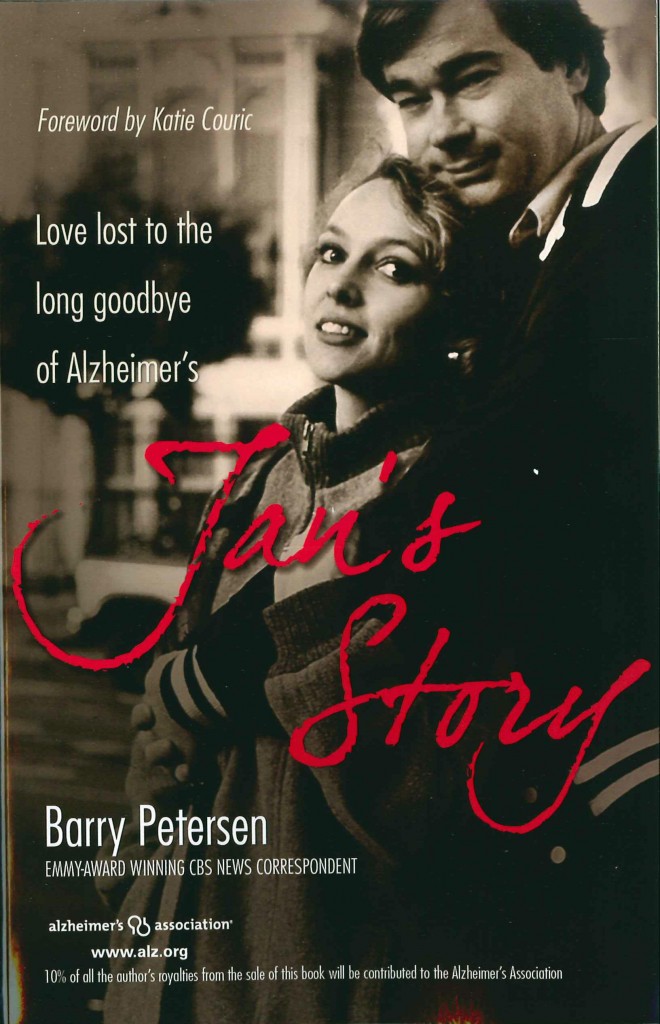Journey Mercies . . . Alzheimers: Walking Into Oblivion
Journey Mercies . . . Alzheimers: Walking Into Oblivion
In her book To Kill a Mockingbird, Harper Lee beautifully wrote . . .
I found this to be the case as I learned more about Barry Petersen.
November is National Alzheimer Awareness Month and our Blog Coordinator, Molly Keating, asked me if I would take the opportunity to write something that we could share to help bring more awareness to this insidious disease. Other than those who were famous and who were willing to share their fate, (President Ronald Reagan, Charlton Heston, and most recently, Glen Campbell) my only connection with Alzheimer’s is with two very close friends, a girlfriend whose mother was diagnosed, and a fellow Rotarian whose wife was diagnosed. Both have expressed their love and devotion, as well as their concern for their care. In conversations with them I have asked naïve, simple questions as I didn’t want them to feel as if I was prying but I also didn’t really know what to ask because I didn’t have any deep knowledge of their situation.
I remember seeing a story several years ago that was shown on the CBS News program “Sunday Morning”, with Charles Osgood. It was a short story told by news reporter Barry Peterson who’s poignant and heart-wrenching account brought tears to my eyes. (You can watch the video I saw here)
Jan Chorlton was a beautiful, vivacious, smart news reporter and Barry Peterson fell head over heels for her. After going through a very tough divorce he never expected to find anyone with her charisma, much less her looks. They fell in love, married in 1985 and . . . of course you would always end that sentence with “and they lived happily every after,” right? Nothing could have been further from the truth. In Barry Peterson’s book Jan’s Story, he describes a love lost to a diagnosis of Early Onset Alzheimer’s Disease. Most people think of Alzheimer’s as a disease of the old. His wife, Jan, was diagnosed in 2005 at the age of 55. His book chronicles their journey into the abyss of Alzheimer’s Disease.
Via amazon.com
In this incredible book his pain is palpable as he describes in detail Jan’s decent into that dark hole. He confesses to spending years denying that anything was wrong. Chronicling the “Seven Stages of Alzheimer’s Disease,” Barry reveals all of the sadness, anger, guilt, exhaustion and helplessness he felt and still feels as he watches the love of his life continue to change before him. The first stage entitled, Walking Into Oblivion: Stage One, reads: No impairment (normal function). Unimpaired individuals experience no memory problems and none are evident to a healthcare professional during a medical interview. As Barry put it, “it seems strange that the first Stage of Alzheimer’s is about showing no obvious symptoms. The answer lies within the disease, an answer that offers the additional terror that Alzheimer’s is already at work before a person knows it.”
After reading Jan’s Story I have been realizing how much I didn’t know, how much I couldn’t or didn’t want to believe what The Disease does, and how utterly terrifying it is. In the past I have attended and supported the Visionary Women’s luncheon, where each year the Women’s Circle of the Alzheimer’s Association honors Orange County caregivers who display extraordinary compassion in caring for those touched by Alzheimer’s disease and related forms of dementia. And, I know of the great educational programs the Orange County Chapter of the Alzheimer’s Association provide to our community, family and private caregivers, and professionals who care for Alzheimer patients. But I had never taken the time to really peel back the layers of The Disease and read a first hand account from one who is walking, running, fleeing from that which will destroy the life of the one suffering from it as well as the lives of those caring for them. Families agonize and relationships dissolve.
Barry Peterson offers the reader a personal tour of not only Jan’s descent, but his as well. He reveals how each and every day he loses a little more of Jan in mind and spirit . . . even while her body was still beautifully alive. His honesty reveals how difficult it was to find others who were caregivers that were willing to meet and create a safe place to speak freely. He brings to life the exhaustion of care-giving, and his immense loneliness. With amazing courage he exposes his own thoughts of suicide, the grief of love lost, and the rejection of his friends as he is judged to be “abandoning” Jan for eventually placing her in a home. He takes you to the brink and gives you the opportunity to make up your own mind about what you would do in his shoes. Decisions that meant he could survive another day.
It is a story of undeniable and enduring love – but a love of one dimension. A love that, destroyed by The Disease, provided no reciprocation. A love that was meant to live forever and which day by day faded into nothingness. It’s a story of a man who traveled a road alone, endured, and found renewal. Barry Peterson chose life.
If you haven’t had the opportunity to take an in-depth look at Alzheimer’s Disease and know and understand the insidious sinister way that it takes away all memory and leaves only the shell of what use to be, please pick up a copy of Jan’s Story or read Still Alice by Lisa Genova. Still Alice is a fictional account of Alice Howland, Cognitive Psychology Professor at Harvard University, who at 50 years old was diagnosed with Early Onset Alzheimer’s Disease.
None of us are certain what our future holds. Barry certainly imagined differently. What I know for sure is not to stand in judgment of others, especially when we don’t want to imagine what it would be like to walk in their shoes. I’ve learned so much from the courageous authors, Barry Peterson and Lisa Genova. I’ve learned that there are some things that we have no control over, and some things we do. I will choose knowledge and understanding that leads to compassion. I will choose life.






39 Comments
Dear Pat,
Thank you so much for sharing your thoughts on Alzheimer’s and introducing readers to the books that you highlight here. When a loved one suffers a decline in cognitive function due to Alzheimer’s or another form of dementia, it is truly a loss. Dr. Pauline Boss has written much on “ambiguous loss” of caring for someone with Alzheimer’s, where the person is physically with us but psychologically absent to some degree. Your empathy for Barry Petersen shines through, and it’s true…we do not know what others are going through and cannot judge their choices.
Appreciatively,
Marnee
Hello Marnee
Your mentioning of “ambiguous loss” has peaked my interest. I don’t fully understand all of the ramifications of Alzheimer’s, but I’m sure you have dealt with that in your practice. It really is a disease that puts families in such a precarious place with their feelings, needs, and their lives.
Thank you so much for sharing Dr. Boss’s reflections – I will soon be looking her up!
Blessings to you, Marnee
Pat